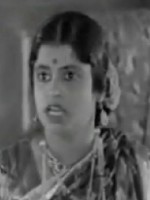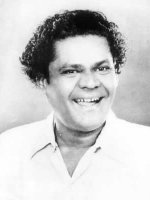Kannika (1947)

If you like this film, let us know!
Kannika was a 1947 Tamil-language film starring T. E. Varadan, M. S. Sarojini, D. Balasubramaniam, M. R. Santhanalakshmi, N. S. Krishnan, T. A. Mathuram, Kali N. Ratnam, Harini, Hemamalini and Lalitha-Padmini. It was directed and produced by South Indian movie pioneer S. M. Sriramulu Naidu.
Synopsis
The movie is about a demon whose life is imprisoned inside a pigeon. A young man destroys the demon inside the pigeon and marries the demon's daughter.Actors
Comments
Leave comment :
Suggestions of similar film to Kannika
There are 39 films with the same actors, to have finally 39 suggestions of similar films.If you liked Kannika, you will probably like those similar films :

Dhaasippen (1943)
, 2h30Directed by Ellis Roderick Dungan
Genres Historical
Actors M. G. Ramachandran, 'Kalaivanar' N. S. Krishnan, R. Balasaraswathi Devi, M. R. Santhanalakshmi
The young devadasi (Balasaraswathi of the ‘Malligai poomalai rojaa' fame) is forced by her family to yield to the lustful zamindar (Das) but she refuses for, she is devoted to Lord Shiva (MGR). She wishes to marry her lover (Mahalingam), but there are a lot of hurdles. The zamindar attempts to kidnap the woman to make her his mistress. But his attempts fail thanks to the intervention of Shiva and his consort Parvathi (Santhanalakshmi). Devadasi is tired of life, Answering her prayers, Shiva transforms her into a ‘Thumbhai' plant. Even today, its flowers are offered to Lord Shiva during worship in many places. Hence, the film also had the title Thumbhai Mahatmyam.

Ambikapathy (1937)
, 3h30Directed by Ellis Roderick Dungan
Actors M. K. Thyagaraja Bhagavathar, M. R. Santhanalakshmi, S. Balaiah, 'Kalaivanar' N. S. Krishnan
Rating65%





The film is based on a story set in the Chola Empire in year 1083 AD. The titular character in the story is Ambikapathy (M K. Thyagaraja Bhagavathar), the son of the Tamil poet Kambar (Serugulathur Sama) who is in love with the Chola princess and daughter of Kulothunga Chola, Amaravati (played by M. R. Santhanalakshmi). The king objects to their love and insists on testing Ambikapathy's literary mettle before judging his worth. The test given to Ambikapathi is that he should write and sing a hundred poems in the field of Puram (dealing with war and politics). The poems should not have any reference to the field of Aram (dealing of love and romance). Ambikapathi begins the test in the King's court with a Kadavul Vaazhthu(invocation to God). Amaravathi who is keeping the count, mistakes the invocation as a poem and counts it as poem number one. When he has sung only ninety nine Puram poems, she thinks he has completed the task and signals him that hundred poems have been sung. Declaring victory, Ambikapathy sings of his love for her and thus fails the test. He is executed by the king.

Prahalada (1939)
Genres Drama
Actors M. R. Santhanalakshmi, M. G. Ramachandran, 'Kalaivanar' N. S. Krishnan
The story is from a short episode in the Vishnu Purana, a holy text of Vaishnavites, that narrates the story of Prahlada, an ardent devotee of Lord Vishnu much against the wish of his father Hiranyakashipu, a demon. All of Hiranyakashipu's attempts to change his son's attitude are in vain. Finally, when he decides to kill his son, Lord Vishnu comes to the rescue of the son, in the form of Narasimha (a man-lion form), and kills the king.
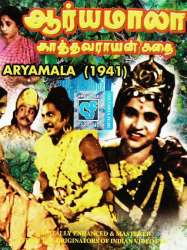
Aryamala (1941)
Genres Drama
Actors Pudukkottai Ulaganathan Pillai Chinnappa, M. R. Santhanalakshmi, S. Balaiah, 'Kalaivanar' N. S. Krishnan
This script must be run from the command line

Jagathalaprathapan (1944)
, 2h56Actors Pudukkottai Ulaganathan Pillai Chinnappa, M. R. Santhanalakshmi, U. R. Jeevarathinam, S. Varalakshmi, S. Balaiah, 'Kalaivanar' N. S. Krishnan
Jagathalaprathapan was based on the fantasy story of a prince who is to be punished from his kingdom for expressing his desire for four celestial maidens, Indrani, Nagakumari, Agnikumari and Varunakumari. The prince, however, escapes punishment and roams in disguise in the company of a friend when he meets a damsel who is Indirakumari in disguise. He marries her and settles down in a kingdom whose king falls in love with his wife and sends the prince away to Nagaloka in order to covet her. The prince, however, succeeds in finding Nagakumari in Nagaloka, Agnikumari in Agniloka and Varunakumari in Varunaloka and succeeds in winning them as wives.
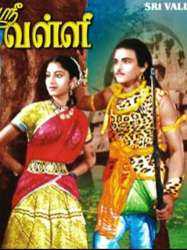
Sri Valli (1945)
, 1h54Directed by Avichi Meiyappa Chettiar
Genres Drama
Themes Films based on mythology, Films about religion
Actors T. R. Ramachandran, 'Kalaivanar' N. S. Krishnan

Mangamma Sapatham (1943)
Actors Ranjan, Vasundhara Devi, 'Kalaivanar' N. S. Krishnan
A village girl is humiliated by a prince and vows to take revenge. She vows to make the prince marry her and have a child who would whip the prince in the court. However, her plans are almost foiled when the prince imprisons her when she tries to seduce him. The story revolves on how she tricks him into falling in love with her and begets a son through the prince who ultimately whips him in court.

Manonmani (1942)
Actors Pudukkottai Ulaganathan Pillai Chinnappa, Thanjavur Ranganayaki Rajakumari, S. Balaiah, 'Kalaivanar' N. S. Krishnan
Manonmani, the Pandya princess (Rajakumari), falls in love in her dream with a prince (Chinnappa) who too does likewise with each unaware of the other's identity! But their love grows deeper in their hearts. The Rajaguru (Sama) is keen on bringing the two kingdoms together and builds a ‘secret way' from one kingdom to the other. However, the King (Perumal) is under the influence of the scheming minister Kutilan, (Balasubramaniam, the name was obviously inspired by the celebrated Kautilya, Chanakya.) The minister's son Balaiah has an eye on the princess, and the father and son try to manipulate the king's mind…

Ashok Kumar (1941)
Genres Historical
Actors M. K. Thyagaraja Bhagavathar, Chittor V. Nagaiah, Pasupuleti Kannamba, 'Kalaivanar' N. S. Krishnan, M. G. Ramachandran, Ranjan
Rating24%





The film is based on an age-old Buddhist folktale connected with Mauryan Emperor Ashoka's son Kunal. The Mauryan prince Kunal was courted by Ashoka's younger queen Tishyarakshita and when he rejected her advances, was falsely accused by the queen of trying to seduce her and was thrown into prison and blinded. The story, however, comes to a happy end with his eyesight being restored by Lord Buddha and the king acquits of all the charges.
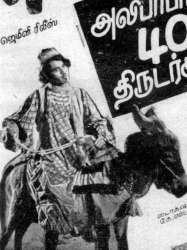
Alibabavum 40 Thirudargalum (1941)
Genres Comedy, Action
Actors 'Kalaivanar' N. S. Krishnan, S. V. Sahasranamam
Rating25%





 Connection
Connection
